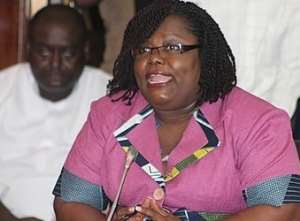
'My father is sick and my mother is dead, so I am living with my auntie,' says a 16-year old pregnant school dropout who lives at Nima in Accra.
'I do not know my father, and my mother is a drunkard; so I live with my grandmother,' cries another 17-year-old girl, who resides in Osu, another neighbourhood in Accra.
Sadly tapping her tummy gently, yet another girl---18-year-old pregnant school dropout in Osu, gloomily declares 'My parents are divorced, so my mother has gone back to her hometown. I live with my grandmother.'
These rather sad tales were highlights of a mid-term evaluation report of a study into commercial exploitation of children (CSEC) discussed at a national stakeholders dissemination meeting on CSEC in Accra.
The study which formed part of two projects being run concurrently by International Needs Ghana to protect children from commercial sex exploitation in and around Accra, found that while the number of children being pushed into early marriage were on the decline, poverty and broken homes were pushing children into commercial sex.
As part of the project which aims at contributing to the elimination of child labour, 1000 children in Accra are expected to be withdrawn and or prevented from being victims of CSEC, rehabilitated and re-integrated into their families and society at large.
Additionally, by the end of the project, 400 parents or caregivers of victims or those at risk to CSEC are expected to be empowered economically.
The international Labour Organisation (ILO) defined commercial sexual exploitation of children as the exploitation by an adult with respect to a child or an adolescent - female or male - less than 18 years old; accompanied by a payment in money or in kind to the child or adolescent (male or female) or to one or more third parties.
The ILO considers commercial sexual exploitation of children an abhorrent violation of the human rights of children and adolescents and a form of economic exploitation similar to slavery and forced labour, which also implies a crime on the part of those who use girls and boys and adolescents in the sex trade.
But the study which had respondents from Accra New Town, Bubiashie, Osu, La, Nima, Maamobi Mallam Atta, James Town, Korle Worko, Chorkor, Agbogbloshie, Timber Market and Madina, found that 41 per cent of the girls who were respondents affirmed that they worked to earn a living while in school.
The project being funded by the Australian Agency for International Development (AusAID) and the Ministry of Foreign Affairs and Trade (MFAT) of New Zealand, is running from April 2011 to March 2014.
Jointly presenting the report, Mr Cromwell Awadey and Ms Joyce Odame of International Needs Ghana, said the research found that 'in most cases children who had sex with adults were unable to successfully bargain condom use—87 per cent of all and 80 per cent of child project partticipants, who had sex with adults did not use a condom in their sexual encounter.
It also found that while a lot more girls in school were having sex with older men, 30 per cent of all the school dropout respondents had been pregnant before with 17 per cent already having a child while 13 per cent had caused abortion.
Mr Awadey said from the findings, Many mothers only gave food to their daughters but even this is not always. Many daughters were expected to provide their own needs - a situation which exposed them to CSEC. Atrocities of step mothers also contributed to children (including boys) leaving home, ending up on the streets and becoming vulnerable to CSEC.'
'The dynamics of commercial sexual exploitation is summed up by an 18-year-old school drop out single mother respondent, who said you use what you have to get what you want.'
The study recommended among other things, reinforced awareness raising and education with particular attention to sex and reproductive health.
Rev Walter Pimpong, the Executive Director of ING, commenting on the report said prevailing economic situations coupled with the breakdown of the extended family system, had resulted in parents and family members of children not living up to their responsibilities.
He said a way to reverse the trend was for the country's educational system to take into cognisance the prevailing moral problems.
By Seth J. Bokpe/Daily Graphic/Ghana
Writer's email:
' );
document.write( addy71148 );
document.write( '' );
//-->
This e-mail address is being protected from spambots. You need JavaScript enabled to view it




 There’s nothing you can do for us; just give us electricity to save our collapsi...
There’s nothing you can do for us; just give us electricity to save our collapsi...
 Ghanaian media failing in watchdog duties — Sulemana Braimah
Ghanaian media failing in watchdog duties — Sulemana Braimah
 On any scale, Mahama can't match Bawumia — NPP Youth Organiser
On any scale, Mahama can't match Bawumia — NPP Youth Organiser
 Never tag me as an NPP pastor; I'm 'pained' the 'Akyem Mafia' are still in charg...
Never tag me as an NPP pastor; I'm 'pained' the 'Akyem Mafia' are still in charg...
 Your refusal to dedicate a project to Atta Mills means you never loved him — Kok...
Your refusal to dedicate a project to Atta Mills means you never loved him — Kok...
 2024 elections: I'm competent, not just a dreamer; vote for me — Alan
2024 elections: I'm competent, not just a dreamer; vote for me — Alan
 2024 elections: Forget NPP, NDC; I've the Holy Spirit backing me and nothing wil...
2024 elections: Forget NPP, NDC; I've the Holy Spirit backing me and nothing wil...
 2024 elections: We've no trust in judiciary; we'll ensure ballots are well secur...
2024 elections: We've no trust in judiciary; we'll ensure ballots are well secur...
 Performance tracker: Fire MCEs, DCEs who document Mahama's projects; they're not...
Performance tracker: Fire MCEs, DCEs who document Mahama's projects; they're not...
 Train crash: Railway ministry shares footage of incident
Train crash: Railway ministry shares footage of incident
